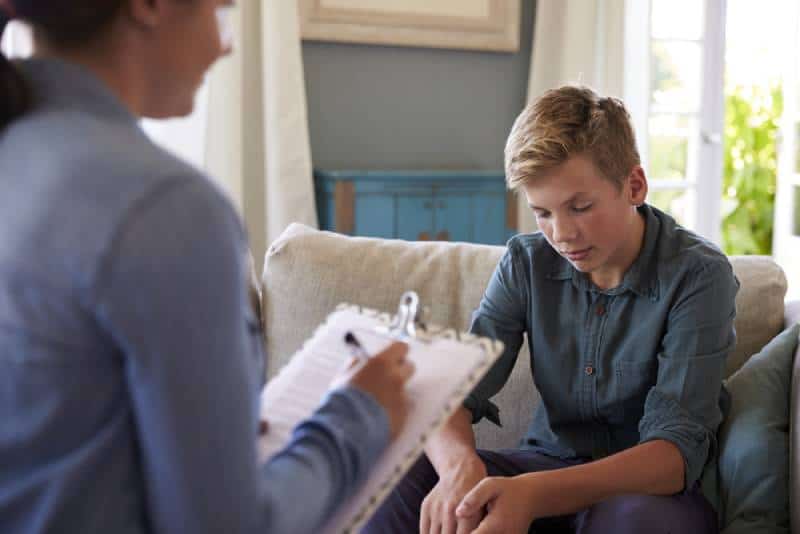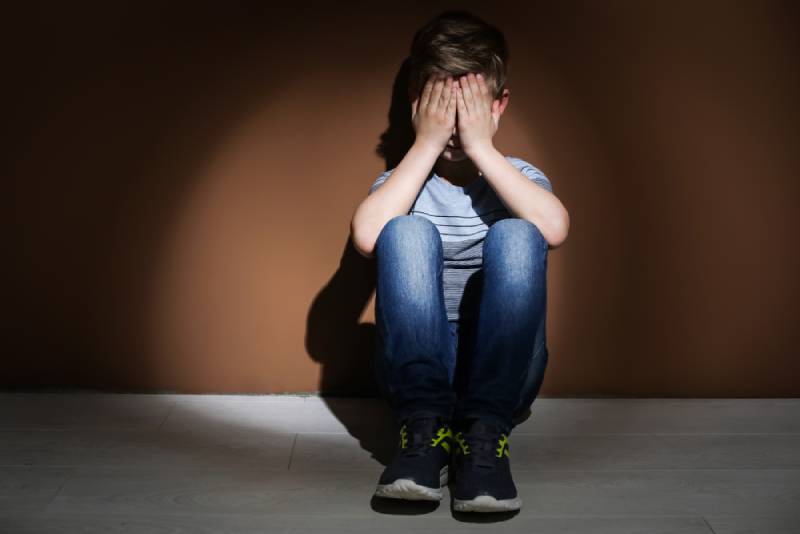Our upbringing and the parenting styles of our moms and dads have a tremendous impact on the person we develop into as adults, which is why children who grow up with an absent father might face additional challenges in life.
The absence of a father can be physical, when the children are mostly living with their mother or another caregiver, or emotional, when the father checks out of his children’s upbringing and doesn’t show any interest in being an active parent.
According to the United States Census Bureau, fatherless homes are now more common than ever – more than 1 out of 4 kids have an absentee father.
While single mothers are more than capable of raising their babies on their own, a combination of different factors can lead to children’s lives being negatively affected by the absence of their biological father or a father figure.
So, if you’re a single mom, it’s important to understand how an absent father could impact your child both in the short and the long-term.
Consequences of father absence
One of my favorite absent father quotes is one by Kent Nerburn: “It is much easier to become a father than to be one.”
It’s very simple but gets the point across – being a father, just like being a mother, takes work, dedication, and patience.
When young children are deprived of a strong fatherly presence in their lives, they can become susceptible to a wide range of issues.
1. Behavioral problems

The negative effects of father absence can impact a child’s well-being in a way that causes behavioral problems, especially in adolescence and adulthood.
For example, many kids who grow up without a fully present father try to come off as domineering among their peers in an attempt to keep their emotional issues hidden.
As a result, they could have trouble adjusting in school or finding friends because they are too preoccupied with maintaining this “persona.”
According to the Center for Disease Control, 85 percent of kids with behavioral problems don’t live with their fathers, which is a very sobering statistic.
But why does a father’s absence have such a deep impact on a child?
Some researchers have found that having a positive relationship with the father, who is a supportive and encouraging presence in their child’s life, helps the social development and self-esteem of children.
In addition, they grow up with a better sense of their worth and are more self-confident, and kids with such qualities have a much easier time adjusting to school and new environments.
2. Attachment trauma
Perhaps you have already heard of the attachment theory, which focuses on how our relationships with our primary caregivers impact the way we relate (in other words, attach) to others and our relationships in adulthood.
Dealing with father absence, whether it be physical or emotional, from an early age can lead to a child developing attachment trauma, or an attachment style that will cause relationship trouble in the future.
There are four attachment styles that are developed in childhood:
- Secure;
- Anxious;
- Avoidant;
- Fearful-avoidant;
The secure attachment style is the healthiest one and develops when a child receives consistent care, affection, and emotional support from their parent/s.
Even if the child is being raised by only one parent or caregiver, they can still develop a secure attachment style.
But if one of the parents, such as the father, is inconsistent, absent, or doesn’t respond to the child’s needs, then this is fertile ground for developing attachment trauma.
The anxious style is formed when the attention and care that a child gets from a parent is not consistent – in adulthood, this manifests itself as wanting to constantly be reassured they are loved or wanted, for example, or being unable to trust others.
If a child is neglected emotionally by a parent, such as in instances when they feel hurt (either physically or emotionally), they can develop the avoidant attachment style.
As adults, they might feel really uncomfortable expressing their emotions and accepting love and affection from someone else.
The fearful-avoidant attachment style is often a result of surviving child abuse or neglect. In adulthood, people with this attachment style can gravitate towards very dysfunctional instead of healthy relationships.
3. Poor mental health

Young men and women who grew up without a stable father role model in their family structure are more prone to developing psychological problems.
Apart from low self-esteem, growing up without a dad puts the child at a higher risk of developing serious mental health issues such as depression and anxiety.
Considering that untreated depression can even lead to suicidal thoughts, it’s pretty clear that this is a very serious consequence of having an absent father.
Researchers Ligang Wang, J. Luo, and W.B. Gao (2011) found an interesting link between children of fathers who are absent and developing an anxiety disorder.
In fact, children of such fathers were more likely to have anxiety, especially boys.
In addition to poor mental health, father absence creates children that are more likely to have a problem with substance or alcohol abuse in adulthood, according to the U.S. Census Bureau.
Anxiety, depression, and substance abuse can all interfere with an adult’s ability to function normally, find a steady job, and form healthy relationships with other people, leading to many other social problems.
4. Promiscuity
The behavioral problems I mentioned above can also manifest itself as adolescent promiscuity, which can often lead to life-changing events like teenage pregnancy.
Young women are particularly vulnerable in this situation, as becoming a teenage mom can severely impact their plans for the future, whether they go to college, and the kind of career they pursue.
According to the Department of Health and Human Services, 71 percent of pregnant teenage girls do not have a relationship with their father.
No matter what the underlying causes are, it’s clear that the lack of a father figure in a teenager’s life can lead them to engage in risky behavior that other teens would avoid.
5. Dropping out of high school

The high percentages of high school dropouts who don’t have a relationship with their father is a clear sign that a father’s absence is detrimental to child development.
This doesn’t mean that kids living in single-parent families are less intelligent than those growing up with both parents!
But the behavioral issues that sometimes arise as a result of this family situation can have a negative impact on the child’s success at school.
As dropping out of high school is a decision that can have a very bad effect on future career prospects, it’s not surprising that 47 percent of fatherless children are more likely to experience poverty, according to the U.S. Department of Health and Human Services.
6. Crime
The lack of structure and discipline that sometimes accompanies fatherless households can lead adolescents to start making friends with the wrong crowd and engage in petty crime, such as theft.
Don’t get me wrong – I am not saying that moms aren’t capable of keeping their kids on the right path!
However, the exhaustion that follows working full-time as a sole provider for your family, coupled with the lack of adequate childcare and a variety of other factors, make it very hard for single moms to enforce rules or monitor their child.
Stephen Demuth and Susan L. Brown in Family Structure, Family Processes, and Adolescent Delinquency: The Significance of Parental Absence Versus Parental Gender researched how the presence of fathers in family structures affects adolescent delinquency in a particular neighborhood.
Their results were clear – a low percentage of fathers in a neighborhood led to increased levels of delinquency among teens.
The absence of a father can also cause teenage boys to search for a father figure elsewhere – and they often find it in gangs and other criminal groups, where they see the leader as the paternal figure.
Recognizing an absent father
When we think of fatherlessness, we usually jump to scenarios where the dad is completely out of the picture, whether it be by choice or as a consequence of a tragic event.
The truth is that a father can be absent even in families where the parents are still together and living under one roof. After all, simply living with their father won’t stop children from feeling the negative effects of father absence.
In fact, both parents, whether they be male or female, should be actively engaged in their children’s upbringing for a healthy and happy childhood.
That’s why it’s very important to know how to recognize an absent dad so that you can deal with the problem right away.
1. Lack of responsibility

Let’s be honest – we have all heard stories of couples where the man barely ever (or never) changes the baby’s diaper while mom pulls all the weight of caring for their new arrival.
Or perhaps he shows no interest in getting up in the middle of the night to soothe the baby when she’s crying – whatever the issue is, this kind of father is not stepping up to the plate.
While many people would argue that a lazy man does not necessarily a bad father make, I believe that in the majority of cases, men who do not put any effort into caring for their child early on can easily turn into absent fathers.
Becoming a parent is a giant responsibility and a father who doesn’t have the willingness to give his baby the care and attention she needs is likely to miss the mark on many other aspects of parenthood, such as when the child starts school or extracurricular activities.
RELATED: The 9 Responsibilities Of A Father: The Household Hero
Men who don’t feel a responsibility to their own family probably won’t be there on special occasions during the child’s life because they haven’t fully embraced the father role – and sometimes even see it as a burden.
2. Selfishness

As moms, we always talk about the sacrifices we make after the baby’s arrival.
From women who go from working every day to becoming stay-at-home-moms to women who must learn how to balance work and motherhood, there is simply no room to be selfish. (Of course, hiding in the bathroom to eat chocolate does not count…)
The best fathers don’t know selfishness either! I remember my own father spent hours teaching me how to ride a bike, always took me to the fair, and made mud pies with me.
Whatever we were doing, I never felt like I was boring him and we always had fun.
While I’m sure that there were numerous times my dad had other things to do, he never let his personal plans get in the way of spending quality time with his kids.
An absent father, on the other hand, always puts his own plans first and doesn’t even think to make time or include his kids in his day.
3. Always working
I understand that there are professions where the father has to spend long periods of time away from home, such as when dad is in the military, but even they find ways of connecting with their kids and being a present father figure in their life.
But workaholic dads who work for as long as 12 hours every day and only see their kids in the morning (if at all) are, essentially, absent.
While providing for your family is important, it’s also key to know where to draw the line.
Life in the 21st century has definitely made work and careers more competitive, but that isn’t an excuse to not make time for the little ones.
A compromise can be reached either by trying to reduce the number of work hours during the week or by completely clearing the schedule for the weekend (this includes not responding to work emails or phone calls).
4. Substance abuse

Unfortunately, children who grow up with a father who is battling addiction are often fatherless, as a person who struggles with substance abuse can rarely be a fully present parent.
Regardless of whether the father is addicted to a substance or another destructive activity such as gambling, he is not able to participate in the upbringing of his kids, leaving the bulk of the responsibility to fall on the mother or another caregiver.
It goes without saying that fathers who have problems with substance abuse should seek treatment as quickly as possible – not just for their children, but for their own sake as well.
Successfully parenting as a single mom
Reading through all these statistics doesn’t paint a pretty picture, but I believe that educating yourself on how absent fathering can impact your children is a fantastic first step to making sure your little one has a happy and healthy childhood.
Still, parenting on your own can sometimes be very difficult without a partner there to “back you up.”
Here are some ways you can seal with single mom struggles and bring structure to your family life and create the best possible environment for your child:
1. Routines and limits

In any family, having regular routines is the best way to instill a sense of discipline in kids and make everyday life easier.
They also bring structure that kids need and help them feel safe at home.
The same goes for limits – while some moms are more strict than others, you need to create rules that you will enforce, regardless of your parenting style.
Kids need to learn from a young age that rules and limits exist to be followed.
If they realize that you are walking all over the very limits you had set, it will only make them believe that breaking rules is not a big deal and doesn’t lead to big consequences.
In addition, it’s important that family members or other caregivers are aware of your rules and enforce them even when you are not there.
2. Be loving, but don’t spoil
Giving your kids plenty of love and affection is a must, and I’m sure you already do that!
It not only allows you to form a stronger bond with your little ones but it also helps their emotional development.
And when one parent isn’t around, it’s natural that you would want to make up for any lost affection or attention.
As you do that, make sure that you’re not falling into the trap of indulgent parenting and overcompensating with gifts and giving in to their every demand.
Saying “no” will not scar them for life. However, raising them to believe that everything must go their way definitely could.
3. Good child care

In the absence of their dad, you definitely need to rely more on hiring nannies or getting family members to take care of your kids when you want some alone time or need to run a few errands.
However, try to find a qualified nanny or experienced babysitter who can do the job and avoid leaving the kids with neighbors you might not know very well, or even friends.
And once you decide on a babysitter, try and go with that person every single time so that there is routine and structure in this area, too.
To wrap up
Having an absent father is increasingly common in our day and age, and if you are a single mom, you can take comfort in knowing that millions of other women are experiencing the same challenges you are.
Growing up in a fatherless household can be very difficult for some children and have very serious effects on their future, potentially leading to mental health problems and delinquency.
However, understanding the consequences of father absence is one of the most important steps to help your children avoid falling into the cycle of negative behavior – I’m sure that you’re off to an amazing start!
References:
- “The Proof Is In: Father Absence Harms Children” published by the National Fatherhood Initiative on the National Fatherhood Initiative website.
- “Research and Statistics” published by the Rochester Area Fatherhood Network on the Rochester Area Fatherhood Network website.
- “The influence of the absence of fathers and the timing of separation on anxiety and self-esteem of adolescents: A cross-sectional survey” by Ligang Wang, J. Luo, and W.B. Gao, published in Child Care Health and Development in September 2011.
- “Family Structure, Family Processes, and Adolescent Delinquency: The Significance of Parental Absence Versus Parental Gender” by Stephen Demuth and Susan L. Brown, published in the Journal of Research in Crime and Delinquency on February 1, 2004.
Like this post? Please share or pin it for later. You can also stay in the loop and follow us on Facebook, Instagram or Pinterest.

This post contains affiliate links. Please see our full disclosure for more info.

